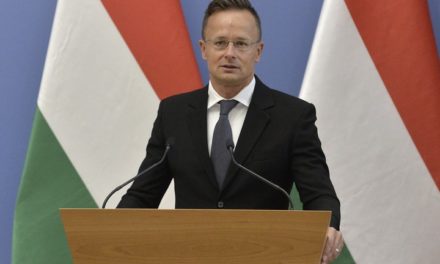Balázs Hidvéghi, a member of the European Parliament (EP) of Fidesz, called the proposal to the European Parliament, which would introduce a complete embargo on fossil fuels from Russia as part of the planned tenth EU sanctions package against Russia, untenable, bad and life-threatening.

Balázs Hidvéghi. https://www.facebook.com/hidveghibalazs
The ruling party politician emphasized in Kossuth radio's Sunday newspaper program that the Fidesz EP representative group did not support the proposal and did not take part in the voting of the related resolution either, because in their opinion, this is already the umpteenth decision on this topic, when it is practically about "impossible texts". should give an opinion.
Balázs Hidvéghi said: the text of the proposal contains quite amazing statements and calls for, for example, weapons deliveries, not only does it welcome the sending of tanks to Ukraine, for example, but it also specifically calls for the delivery of fighter jets and long-range missile systems.
He added that, based on the false statement that "this is our war", NATO and the Western alliance are increasingly involved in this conflict.
"It is a fundamentally wrong approach that Ukraine is fighting our war, it only predicts further escalation," said the MEP representative.
The politician reminded that the proposal also calls on EU member states and candidate countries to support the tenth sanctions package, however, a complete and immediate embargo covering all fossil energy sources and uranium would also result in a dangerous and unsustainable situation.
"These are proposals that do not bring the end of the war closer, as they have not done so in the past year, the intensity of the war has not decreased, but rather increased," he said, pointing out that all of this would mean "further suicidal steps that are harmful to us, with which we would slowly destroy our own economy, the safety and living conditions of the Hungarian people and other Europeans, or put them in grave danger".
The Fidesz MEP noted that this is not the first such "extremely dangerous proposal" in the European Parliament.
Balázs Hidvéghi responded to the host's question about the corruption scandal in Brussels and said that it can be said with more certainty than before that this is the biggest such corruption case in the history of the EP and, in a broader sense, of Brussels politics.
"It can be seen that it is an extensive, long-standing system of corruption, I think that trust in the entire institutional system has wavered," he said.
He stated: because of the scandal, there is an attempt to deny it on the European left, and they are talking about the fact that this is only the specific case of a few individuals, when in fact it is an institutional practice that manipulates the entire operation.
In recent times, the operation in Brussels is increasingly permeated by the application of double standards, which, for example, the Hungarians also suffer from, he added.
Balázs Hidvéghi emphasized: For some time in Brussels, decisions have been made not on the basis of objective facts, but rather on the basis of political and ideological biases, and these are becoming more and more extreme, impatient and exclusionary, thus endangering the functioning of the entire union.
"Brussels should go on a more sober, balanced and better path in many places, I hope that next year's elections can help us in this," he said.
In the program, the Fidesz EP representative, speaking about the EP proposal on the transparency of political advertising, said that this is also a dangerous proposal, as it could interfere with the election campaign of individual states.
"It is unacceptable that an institution operating practically as a political committee or a censorship office decides what can and cannot be included in an advertisement, what constitutes acceptable or good political advertising," said the Fidesz EP representative, noting that it is the same " trampling on the borders of the member states, centralizing and otherwise anti-democratic', which today characterizes decision-making in Brussels and the center of the union.
Source: demoktara.hu













